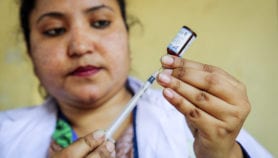Send to a friend
The details you provide on this page will not be used to send unsolicited email, and will not be sold to a 3rd party. See privacy policy.
[NEW DELHI] India and Africa have agreed to boost scientific collaboration at a high-level meeting of science ministers from both countries.
At talks in Delhi last week (2 March), the ministers identified four areas for closer ties: capacity building; science, technology and innovation for development; knowledge transfer and adoption; and identifying common research priorities for the future.
They agreed to set up a range of collaborative strategies including creating fellowships for African researchers in India and exchange visits, the holding of joint workshops, and measures to foster new academic and industrial links.
They also agreed to jointly strengthen selected African institutions, to begin over the next three years with the Institute Pasteur in Tunisia, Benin’s Institute for Mathematics and Physical Sciences, and the School of Science and Technology of Masuku in Gabon.
Egypt’s and India’s science ministers, Nadia Eskander Zakhary and Vilasrao Deshmukh, said common challenges and societal needs in the two regions range from affordable health care to climate change and water security.
India’s junior minister for science, Ashwini Kumar, said training and capacity building "should move from discovery science to solution science, and that Africa and India should explore newer models on intellectual property management".
He said India has already proposed to set up pan-African institutions to study food processing and textiles, and an Africa–India weather forecasting centre which could benefit the agriculture, fisheries and disaster preparedness sectors.
"We have received a request to support the establishment of an Africa-India University for life and earth sciences in Nigeria, and would be happy to support this," Kumar added.
On the sidelines of the conference, ministers from Mozambique signed a memorandum of understanding with India’s National Innovation Foundation (NIF) to help Mozambique establish a similar foundation that would identify and assist grassroots innovations.
NIF chair Anil Gupta told SciDev.Net the foundation was also in talks with Botswana, Eritrea, Rwanda, Tanzania and Zimbabwe, which had expressed interest in replicating the NIF model.
India’s growing interest in strengthening science ties has been reflected in the launch of an Africa–India S&T Cooperation Initiative in New Delhi in 2008, a separate S&T programme between India and the African Union launched in 2010, and the annual C. V. Raman fellowships — also launched in 2010 — to enable African scientists to undertake research at research institutes and universities in India.
Purna Samanta, senior lecturer at the School of Economics at the University of Nairobi said the latest agreement is significant and would boost the technological development of African countries, while enabling India to extend its influence in Africa, which could be a huge market for Indian products.
He said there were many shared areas of interest between African nations and India, he said, such as food and water security, renewable energy and traditional knowledge, particularly in alternative medicine.
However he said the recent surge in India’s interest in Africa could also be a response to massive Chinese investment in Africa in recent years, with the continent offering new ground for the long-standing economic and technological rivalry between the two Asian nations, he told SciDev.Net.
"With 700 million people, Africa offers great opportunity for India’s fast growing technological sector and it can’t afford to ignore this when China is making great inroads. It wants to assert herself more and it has language and tradition on her side," he said.













